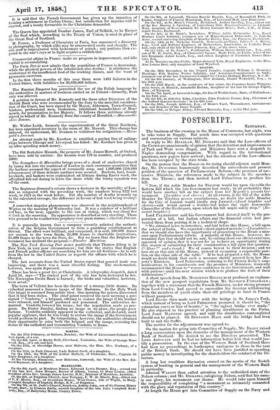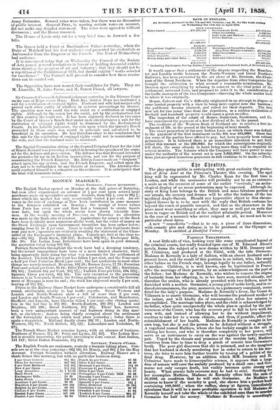POSTSCRIPT.
SATURDAY.
The business of the evening in the House of Commons, last night, was to take votes in Supply. But much time was occupied with questions and conversation on various subjects. In reply to Mr. HEADLAM, Mr. Disnarm said that the Law-officers of the Crown are unanimously of opinion that the detention and imprisonment of Park and Watt were illegal, and Ministers have sent a despatch to Naples demanding compensation. With regard to the international questions, new papers have arrived ; but the attention of the Law-officers has been occupied by the state trials.
On the motion that the House on its rising should adjourn until Mon- day, Mr. Dm:comm.. humorously described the antecedents and present position of the question of Parliamentary Reform—the promises of suc- cessive Ministers, the references made to the subject in the speeches from the Throne ; and then invited Lord Palmerston to produce his bill.
" Now, if the noble Member for Tiverton would lay upon the table the Reform Bill which the late Government had ready, in all probability they would have another bill on the subject from her Majesty's present Go-
vernment. (Laughter and cheers.) At all events, if the bill of the noble Member for Tiverton proves unsatisfactory, no doubt the noble Member for the City of London would kindly step forward—(Loud laughter and cheers)—and would spread a feather-bed before the right honourable Chancellor of the Exchequer, upon which his bill might safely drop." (Re- newed laughter.) Lord PALMERSTON said his Government had devoted itself to the pre- paration of a bill, but Indian affairs and the financial crisis had pre- vented them from putting it in a technical shape. " We obtained leave to introduce, and laid before this House, a bill upon the subject of India. We expected—short-sighted mortals !—)cLaugliter)—
that we should also have the opportunity of presenting to the House a mea- sure upon Parliamentary reform. A majority of this House, however, de- termined that that should not be, and, by cutting short our Official existence, appeared of opinion that it was not for us to have an opportunity during
this session of submitting for their consideration a bill upon this question. (" Hear .7- and a laugh.) We of course bowed to their decision ; and we
now sit on this side of the House, instead of occupying a responsibleposi-
tion on the other side of the table." If he had prepared a bill, the House would no doubt think that such a measure should proceed from her Ma- jesty's Ministers. Lord Palmerston' referring. to Sir Fitzroy Kelly's Com- munications to his constituents and the promises of Ministers, ironically recommended the House to " repose confidence in the Government, and wait with patience until tbe next session which is to produce the fruit of their deliberations."
A short speech from Mr. Moxexxos MILNES next produced an explana- tion of the new passport regulations from Mr. SEYMOUR FITZGERALD ; together with a statement that the French Minister, under strong pressure from Lord Cowley, had agreed to reconsider his decision withdrawing from the members of yacht clubs their old privilege to land in France without passports. Lord Eteno then made merry with the bridge in St. James's Park, which instead of being as Lord Palmerston 'promised it should be, "the catenarian curve or line of beauty," is "the ugliest bridge ever made." He also objected to the practice of planting shrubberies in the Parks. Lord Joux MANNERS agreed, and said the shrubberies contemplated should not be planted. Sir BENJAMIN HALL said the bridge had been built to suit the traffic.
The motion for the adjournment was agreed to.
On the motion for going into Committee of Supply, Mr. BlIADY raised a long conversation upon the demerits of the management of the Western Bank of Scotland. He desired to see the Directors prosecuted. The LORD ADVOCATE said he had no information before him that would jus- tify a prosecution. In the ease of the Western Bank of Scotland there had been no proceedings in bankruptcy analogous to those in the case of the British Bank. He should not have been justified in spending public money in investigating for the shareholders the conduct of the Di- rectors.
A long but resultless discussion ensued on the merits of the Scotch system of banking in general and the management of the Western Bank in particular.
Admiral WALCOT then called attention to the unfinished state of the Nelson column ; and Mr. DISRAELI, eulogizing Nelson, saidthat his name is our glory, his monument our shame. He would take upon himself the responsibility of completing " a monument so intimately connected with the glory and reputation of this country.". At length the House got into Committee of Supply on the Navy and
Army Estimates. Several votes were taken, but there was no discussion of public interest. General Pest, in moving certain votes on account, did not make any detailed statement. The votes were agreed to without discussion ; and the House resumed.
The House of Lords only sat for a very brief time to forward a few bills.
The Queen held a Court at Buckinghain Palace yesterday, when the Duke of Malakoff had his first audience and presented his credentials as Ambassador from the Emperor of the French. The Earl of Malmesbury had audience.
It is announced today that on Wednesday the Council of the Society of Arts passed general resolutions in favour of holding decennial exhibi- tions showing the progress of art and industry ; that they should not be a repetition of the Exhibition of 18:51, but should exhibit " works selected for excellence." The Council will proceed to consider how these resolu- tions can be carried out.
The Opposition have now named their candidates for Paris. They are M. Lionville, M. Jules Fevre, and M. Ernest Picard, all lawyers.
Sir Cm:swell Cresswell delivered judgment yesterday in the Divorce Court on the case of Hope versus Hope. Here Mrs. Adrian Hope has instituted a suit for a restitution of conjugal rights. Husband and wife had reciprocally proved each other guilty of adultery in anterior proceedings for divorce. The question now was could the wife insist on a restitution of conjugal rights. Although by the canon law she could, yet by the ecclesiastical law of this country she could not. It has been expressly declared in two cases by the Court of Queen's Bench that under such circumstances a suit for the restitution of conjugal rights would be dismissed by the Ecclesiastical Courts. In his humble judgment, the rule upon which the Queen's Bench proceeded in those cases was sound in prieciple and calculated to be beneficial in its operation. He had therefore come to the conclusion that this suit for the restitution of conjugal rights could not be maintained by the wife, and that the husband must be dismissed.
The Special Commission sitting at the Central Criminal Court for the trial of Simon Bernard was yesterday oecupied in hearing the speeches of the coun- sel for the defence and prosecution. The defence was that Bernard intended the grenades for use in an Italian insurrection, and not for the purpose of assassinating the French Emperor. Mr. Edwin James made an "eloquent " attack upon the spy system, and the French Emperor, and called upon the Jury not to be intimidated by any threats of invasion. The Attorney-Ge- neral confined himself to n comment on the evidence. It is anticipated that the trial will terminate today.



























 Previous page
Previous page